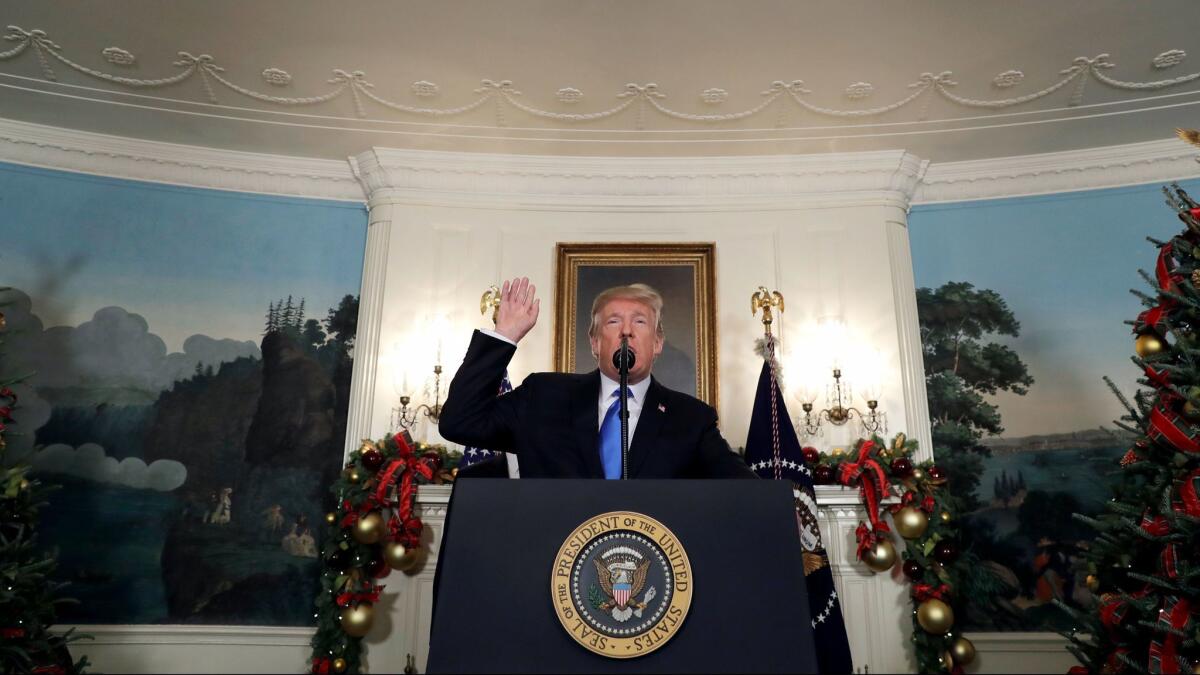Op-Ed: Trump delivers a death blow to the two-state solution

President Trump’s decision to recognize Jerusalem as the capital of Israel represents a major break with decades of U.S. foreign policy. It is a final, devastating blow to the prospect of a two-state solution for Israel’s conflict with the Palestinians.
The move involves, first, a contemptuous dismissal of Palestinians’ aspirations and rights, a denial of their claim to the city they consider their capital, where almost 400,000 of them live. To accept Jerusalem as Israel’s capital is to participate in a project of violent social engineering, one that is slowly driving out Palestinians and replacing them with Jewish settlers.
Longstanding Israeli policy aims to forcibly manipulate the numbers of Jews and non-Jews in the city to maintain an “ideal” ratio of Jewish residents. This grotesque policy is realized by severely underinvesting in infrastructure for Palestinian areas of the city, by denying Palestinians building permits, by demolishing Palestinian homes, by stripping Palestinians of residency rights, by isolating Palestinian neighborhoods from one another and from the West Bank with a wall, and by turning a blind eye to violent Jewish hooliganism against Palestinian residents.
All the while, Israel moves more and more Jews into settlements built on land illegally annexed to Jerusalem following the capture of the eastern part of the city in 1967.
What looks like a victory for Israeli apartheid now may well turn out to be a turning point on the road to its eventual demise.
Recognizing Israel’s claim to the city endorses this slow-motion ethnic cleansing and the apartheid policies sustaining it. No other state acknowledges Israel’s sovereignty over Jerusalem because its projection of sovereignty is the product of exactly this ongoing and historical violence.
After all, Israel’s claim to Jerusalem as the “unified and eternal capital of the Jewish people” is tenuous at best. The U.N. Partition Plan of 1947, which broke Palestine into putative Jewish and Arab states — and on the basis of which Israel declared its independence — maintained Jerusalem as an entity separate from either state. Israel captured the western part of the city by force in 1948. It captured the eastern part of the city by force in 1967.
Under international law, the status of Jerusalem remains unsettled. The Security Council has consistently affirmed that East Jerusalem is part of the Palestinian territory under military occupation, and hence, like the West Bank, it can’t legally be annexed or colonized.
As recently as December 2016, U.N. Security Council Resolution 2334 condemned “all measures aimed at altering the demographic composition, character and status of the Palestinian Territory occupied since 1967, including East Jerusalem, including, inter alia, the construction and expansion of settlements, transfer of Israeli settlers, confiscation of land, demolition of homes and displacement of Palestinian civilians, in violation of international humanitarian law.” For Trump to endorse Israel’s claim to the entire city, then, is to endorse illegality.
As important, Trump’s action puts an end to the two-state solution, which once envisaged the creation of a Palestinian state in the territories occupied in 1967 with East Jerusalem as its capital. It demolishes the facetious claim that the United States is an honest broker between the parties. (Anyway, the idea that someone as incompetent or maliciously partisan as Trump’s son-in-law, Jared Kushner, appointed by Trump to oversee peace negotiations, could be either honest or a broker is laughable.) Accepting Israel’s claim to Jerusalem isn’t neutral as Trump pretends. It precludes the Palestinians’ claim, and without East Jerusalem, there is no two-state solution.
What Trump and with him the United States are signing on to instead is a bleak vision of violent racial division, injustice and inequality. Whether the president has actually thought this through is unclear and improbable, but the reality on the ground in Israeli-controlled Jerusalem — and indeed through all the territories under Israeli control — seamlessly fits into his ideological landscape of white supremacy and Islamophobia. Little wonder, then, that Israel’s right-wing government has been so gleeful in its embrace of Trump, and so quick to jump at this endorsement.
And yet it will not be easy to sell this vision to a broader public in the U.S. or the world at large. Israel has been able to maintain its apartheid policies for so long because they are disguised by a thin veneer of democracy and the supposed search for peace. The demise of the two-state solution and the increasingly obvious forms of discrimination at play in the single state that remains will show those policies for what they are — illegitimate. Strangely enough then, what looks like a victory for Israeli apartheid now may well turn out to be a turning point on the road to its eventual demise.
Saree Makdisi is a professor of English and comparative literature at UCLA. He is the author of “Palestine Inside Out: An Everyday Occupation.”
Follow the Opinion section on Twitter @latimesopinion and Facebook.
More to Read
A cure for the common opinion
Get thought-provoking perspectives with our weekly newsletter.
You may occasionally receive promotional content from the Los Angeles Times.





